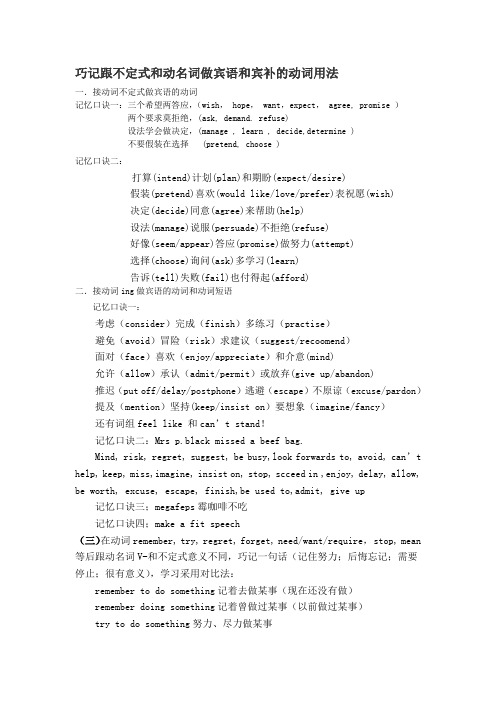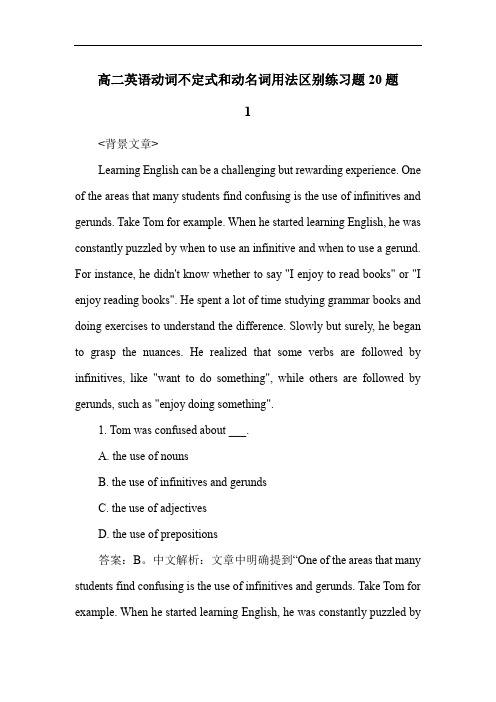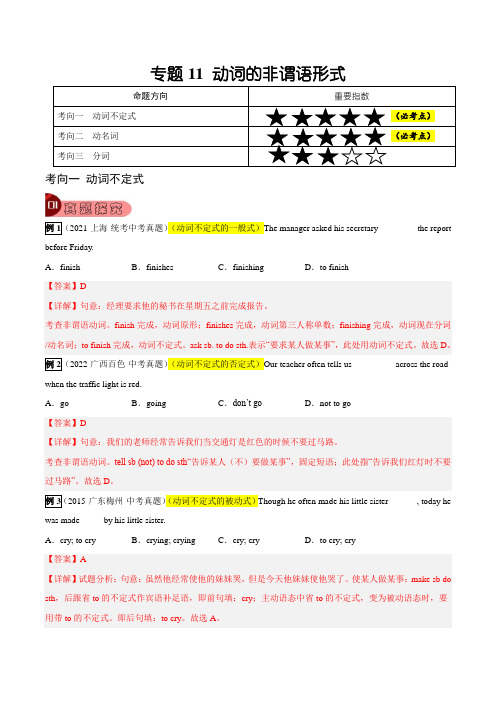跟动词不定式和动名词作宾语的练习题
- 格式:doc
- 大小:39.50 KB
- 文档页数:2


初中英语动词不定式与动名词综合练习20题1. ()is good for your health.A. To exerciseB. ExercisingC. ExercisesD. Exercise答案:A 。
解析:动词不定式To exercise 作主语,表示“锻炼”这个行为,动名词Exercising 也可作主语,但在本句中To exercise 更符合表达习惯。
2. He wants ()a doctor when he grows up.A. to beB. beingC. isD. are答案:A 。
解析:want to do sth. 是固定短语,“想要做某事”,所以用to be ,表示“想要成为” 。
3. My mother decided ()shopping this afternoon.A. to goB. goingC. goesD. went答案:A 。
解析:decide to do sth. 是固定搭配,“决定做某事”,故选to go 。
4. It's important ()English well.A. to learnB. learningC. learnsD. learned答案:A 。
解析:It's + 形容词+ to do sth. 是常用句型,“做某事是……的”,这里用to learn ,表示“学好英语是重要的” 。
5. They hope ()to Beijing next week.A. to goB. goingC. goesD. went答案:A 。
解析:hope to do sth. 是固定用法,“希望做某事”,所以选to go 。
6. ()is good for your health.A. RunningB. RunC. Runs答案:A。
解析:动名词Running 作主语,表示“跑步”这个动作,B 选项Run 是动词原形,不能作主语,C 选项Runs 是第三人称单数形式,也不能作主语。

巧记跟不定式和动名词做宾语和宾补的动词用法一.接动词不定式做宾语的动词记忆口诀一:三个希望两答应,(wish, hope, want,expect, agree, promise )两个要求莫拒绝,(ask, demand. refuse)设法学会做决定,(manage , learn , decide,determine )不要假装在选择 (pretend, choose )记忆口诀二:打算(intend)计划(plan)和期盼(expect/desire)假装(pretend)喜欢(would like/love/prefer)表祝愿(wish)决定(decide)同意(agree)来帮助(help)设法(manage)说服(persuade)不拒绝(refuse)好像(seem/appear)答应(promise)做努力(attempt)选择(choose)询问(ask)多学习(learn)告诉(tell)失败(fail)也付得起(afford)二.接动词ing做宾语的动词和动词短语记忆口诀一:考虑(consider)完成(finish)多练习(practise)避免(avoid)冒险(risk)求建议(suggest/recoomend)面对(face)喜欢(enjoy/appreciate)和介意(mind)允许(allow)承认(admit/permit)或放弃(give up/abandon)推迟(put off/delay/postphone)逃避(escape)不原谅(excuse/pardon)提及(mention)坚持(keep/insist on)要想象(imagine/fancy)还有词组feel like 和can’t stand!记忆口诀二:Mrs p.black missed a beef bag.Mind, risk, regret, suggest, be busy,look forwards to, avoid, can’t help, keep, miss,imagine, insist on, stop, scceed in ,enjoy, delay, allow, be worth, excuse, escape, finish,be used to,admit, give up 记忆口诀三;megafeps霉咖啡不吃记忆口诀四;make a fit speech(三)在动词remember, try, regret, forget, need/want/require, stop, mean 等后跟动名词V-和不定式意义不同,巧记一句话(记住努力;后悔忘记;需要停止;很有意义),学习采用对比法:remember to do something记着去做某事(现在还没有做)remember doing something记着曾做过某事(以前做过某事)try to do something努力、尽力做某事try doing something试着做某事(看能否达到预期的结果)stop to do something开始做某事(停下正在做的事,开始做另一事)stop doing something停止做某事(停止正在做的事)regret to do something对将来做的事感到遗憾、惋惜regret doing something对已经做过的事感到后悔mean to do something打算,想,意图…mean doing something意味着want/require/need to be done某事需要做want/require/need doing某事需要做(这时动名词和主语之间有动宾关系,如: The room needs cleaning/needs to be cleaned)can’t help to do sth.不能帮助做某事can’t help doing sth.禁不住做某事动词接不定式和动名词意思一样双方一旦开始(begin, start),无论喜欢与否(like, prefer , hate, dislike)都要继续下去(continue),都不能打算忽视开始的爱(intend, attempt, propose, neglect,commence, love)(四)请牢记在下列固定句式中,动词用V-ing式:There is no point arguing further. 再争辩下去没有意义。

动词不定式与动名词作主语和宾语的用法浅析一、作主语动词不定式和动名词都具有名词的特征,所以都可以在句中作主语。
1.不定式作主语(1)To do her homework often takes her one and a half hours every evening.(2)To do morning exercises every day is good for your health.(3)To learn English well is very easy for me.不定式(或不定式短语)作主语时常用"It" 来代替,称为形式主语,真正主语(不定式)放在句尾,如上面的句子可改为:(1)It often takes her one and a half hours to do her homework every evening.出现句型“It takes sb. time to do sth.”例如:①It will take the workers 3 years to build the building.②It took me only a few minutes to have breakfast.③How long did it take you to clean your room?(2)It is good for your health to do morning exercises every day.(3)It is very easy for me to learn English well.出现句型: “It is + 形+ for / of sb. to do sth.”例如:①It’s very difficult for me to walk on the ice.②It’s kind of you to help me.③It was quite important for you to say that to him at that time.当形容词表达人所具有特性时用of sb., 当形容词表达事物的特征时用for sb. 2.动名词作主语(1)Doing morning exercises is very good for your health.(2)Reading aloud is very important in learning English.(3)Getting up early is a good habit.二、作宾语1.有些动词或动词词组常用不定式作宾语,常见的有:agree , ask, choose, decide, hope, promise, want, wish, would like等;而有些动词或动词词组常用动名词作宾语,常见的有:enjoy, finish, keep, mind, miss, suggest, hate, be busy, look forward to等。

不定式和V-ing作宾语(一)只接不定式作宾语的动词有:打算intend 计划plan 期盼expect/ desire / hope/ wish 假装pretend 帮助help 喜欢would like/ love/ prefer 设法manage 说服persuade 好像seem/appear 决定decide / determine/ make up one’s mind学习learn 努力attempt拒绝refuse 主动提出offer 选择choose 承诺promise 失败fail 付得起afford 同意agree 询问ask碰巧happen 申请apply 尽某人最大的努力try one’s best (二)只接V-ing作宾语的动词有:考虑consider 完成finish 练习practise 避免avoid 冒险risk 介意mind 建议suggest/ recommend/ advice 喜欢enjoy 感激appreciate 允许allow 承认admit/ permit 放弃give up /abandon 逃避escape 想象imagine/ fancy 推迟put off/ delay/ postpone 提及mention 错过miss 突然开始burst out 坚持keep/ insist on 不能忍受can’t stand想要feel like 禁止forbid阻止prevent 包括include 忙于be busy 值得be worth(三)可接不定式也可接动名词作宾语,意思相同的动词有:开始start/ begin 继续continue(四)可接不定式也可接V-ing作宾语,意思不相同的动词有:like/ love/ hate to do something具体某次喜欢(讨厌)做某事like/ love/ hate doing something一直喜欢(讨厌)做某事remember/ forget to do something记着(忘记)去做某事(现在还没有做)remember/ forget doing something记着(忘记)曾做过某事(以前做过某事)try to do something努力、尽力做某事(目标)try doing something试着做某事(过程)stop to do something开始做某事(停下正在做的事,开始做另一事)stop doing something停止做某事(停止正在做的事)regret to do something对将来做的事感到遗憾、惋惜regret doing something对已经做过的事感到后悔mean to do something打算,想,意图…mean doing something意味着can’t help to do s omething不能帮助做某事c an’t help doing s omething禁不住做某事(五)请牢记在下列固定句式中,动词用V-ing:There is no point arguing further. 再争辩下去没有意义。

初一英语动词不定式作宾语练习题30题答案解析版1. She wants ______ some books this weekend.A. buyB. to buyC. buyingD. bought答案解析:B。
在这个句子中,“want”是一个常用的动词,其后需要接动词不定式作宾语,表示想要做某事,“want to do sth”是固定用法。
选项A“buy”是动词原形,不能直接跟在“want”后面;选项C“buying”是动名词形式,不符合“want”的用法;选项D“bought”是过去式,也不符合要求。
2. I hope ______ a good student.A. beB. to beC. beingD. been答案解析:B。
“hope”这个动词后面接动词不定式作宾语,表示希望做某事,即“hope to do sth”。
选项A“be”是动词原形,不能直接跟在“hope”后;选项C“being”是动名词形式,不符合“hope”的用法;选项D“been”是过去分词,也不正确。
3. He plans ______ his grandparents next month.A. visitC. visitingD. visited答案解析:B。
“plan”作动词时,后面接动词不定式作宾语,表示计划做某事,也就是“plan to do sth”。
选项A“visit”是动词原形,不能跟在“plan”后面;选项C“visiting”是动名词形式,不符合要求;选项D“visited”是过去式,不适用。
4. My mother likes ______ cakes for me.A. makeB. to makeC. makingD. made答案解析:B。
“like”这个动词既可以接动名词也可以接动词不定式作宾语,但是在这个句子里,从初一的教学重点以及表示具体某次的喜好时,用动词不定式更合适,即“like to do sth”。

初一英语动词不定式作宾语练习题40题1.She wants _____ a new book.A.buyB.to buyC.buysD.buying答案:B。
“want to do sth”是固定用法,表示“想要做某事”。
A 选项缺少to;C 选项是动词第三人称单数形式,不符合语法;D 选项“buying”是动名词形式,也不符合语法。
2.I would like _____ to the park.A.goB.to goC.goesD.going答案:B。
“would like to do sth”表示“想要做某事”。
A 选项缺少to;C 选项是动词第三人称单数形式,不符合语法;D 选项“going”是动名词形式,也不符合语法。
3.They hope _____ good grades.A.getB.to getC.getsD.getting答案:B。
“hope to do sth”表示“希望做某事”。
A 选项缺少to;C 选项是动词第三人称单数形式,不符合语法;D 选项“getting”是动名词形式,也不符合语法。
4.We want _____ basketball after school.A.playB.to playC.playsD.playing答案:B。
“want to do sth”表示“想要做某事”。
A 选项缺少to;C 选项是动词第三人称单数形式,不符合语法;D 选项“playing”是动名词形式,也不符合语法。
5.She would like _____ a movie.A.seeB.to seeC.seesD.seeing答案:B。
“would like to do sth”表示“想要做某事”。
A 选项缺少to;C 选项是动词第三人称单数形式,不符合语法;D 选项“seeing”是动名词形式,也不符合语法。
6.They hope _____ a picnic.A.haveB.to haveD.having答案:B。



跟动词不定式和动名词作宾语的练习题1.We have planned to make a school。
programme.2.Do you know when the party starts?3.I find it very XXX foreigners.4.XXX about making a phone call to her parents.5.What bad weather。
I hate going out on cloudy days.6.Do you really enjoy playing the lin every day?7.My parents asked me to do my homework on time.8.I'm really sorry。
I ot to close the door before I left.9.I didn't want my parents to worry about me。
but I'm afraid of staying at home alone.10.I XXX.11.Betty。
we need to make a plan.文章没有格式错误和明显有问题的段落,但是有些句子需要小幅度改写,以使其更加流畅和自然。
8.Tom went out after XXX.9.There's so much us food。
I can't XXX.10.Remember to see me when you come to XXX.11.I would like to stay with you forever.12.They start writing an English article for the newspaper.13.Daming XXX English in and out of class.14.XXX around the world because he XXX.15.Can you tell me how to search on the。

初中英语动词不定式与动名词专项练习一、动词不定式的用法1)作主语To learn English well is not easy. 或It is not easy to learn English well.2)作表My wish is to become a teacher。
3)作宾语Most of us like to watch football matches。
4)作宾语补足语He told me to be here on time。
5)作定语I have nothing to say about that thing.6)作状语He stopped to have a look。
否定形式:not + to + 动词原形构成例如:He asked me not to make such a mistake。
2、动词不定式与疑问词连用:例如:(1) He doesn't know how to use the machine. (不定式作宾语)(2)How to use the machine is a question。
(不定式作主语)(3)The question is when to go there. (不定式作表语)3、省to 的动词不定式1)使役动词let, have, make:2)感官动词see, watch,look at,notice,hear,listen to, smell, feel,find 等后作宾补,省略to。
3)would rather,had better + do4、不定式的特殊句型:1)too…to…:太…而不能…He is too excited to speak.2)enough to do:足以做…The child is old enough to go to schooll3)Why not +动词原形"表达向某人提出建议Why not take a holiday?4)so as (not)to do:表示目的Go in quietly so as not to wake the baby。

不定式或动名词作动词宾语的用法在第十单元我们学习了不定式的句法功用,可以看出,不定式和动名词都可以作主语、宾语、表语、定语和补语。
作主语和表语时,动名词形式表示一般的、概念性的、时常的动作,而动词不定式常表示一时的、偶然的行为和动作。
如:Being a doctor is a good choice.当医生是不错的选择。
(对任何人、任何时候而言都是这样的)To be a good doctor is my dream.当个好医生是我的梦想。
(对个人而言,是个别情况)用动名词还是不定式作宾语,主要分为以下四种情况:(1)只可使用动名词作宾语的动词:enjoy,miss,practice,prefer,suggest,consider,appreciate,avoid,mind,imagine,finish ,admit,deny,delay,risk等。
只跟动名词的短语:feel like,stick to,devote to,pay attention to,be worth,be busy,can’t help,it is no use,be used to (习惯于),look forward to,can’t stand等。
(2)只可使用不定式作宾语的动词:wish,hope,promise,expect,pretend,want,agree,refuse,prepare,manage,persuade, afford,offer,attempt,decide等。
只跟不定式的习语:would like/love to等。
(3)既可接动名词,又可接不定式作宾语的动词有:start,begin,continue,like,love,hate等,意思基本没有区别。
love,like和hate接动名词和不定式时,表示长久的、规律性的好恶用动名词,表示一时的、个别性的好恶常用不定式。
如:He hate eating fish from his childhood.他从小就不喜欢吃鱼。

八年级英语动词不定式练习题30题含答案解析1.She wants _____ a new bike.A.buyB.to buyC.buyingD.buys答案解析:B。
want 后面接动词不定式作宾语,所以是to buy。
A 选项buy 不能直接跟在want 后面;C 选项buying 是动名词形式,want 后面不接动名词;D 选项buys 是第三人称单数形式,want 后面也不接第三人称单数形式。
2.He hopes _____ a good student.A.beB.to beC.beingD.is答案解析:B。
hope 后面接动词不定式作宾语,所以是to be。
A 选项be 不能直接跟在hope 后面;C 选项being 是动名词形式,hope 后面不接动名词;D 选项is 是第三人称单数形式,hope 后面也不接第三人称单数形式。
3.They plan _____ a picnic this weekend.A.haveB.to haveC.havingD.has答案解析:B。
plan 后面接动词不定式作宾语,所以是to have。
A 选项have 不能直接跟在plan 后面;C 选项having 是动名词形式,plan 后面不接动名词;D 选项has 是第三人称单数形式,plan 后面也不接第三人称单数形式。
4.We decide _____ to the park tomorrow.A.goB.to goC.goingD.goes答案解析:B。
decide 后面接动词不定式作宾语,所以是to go。
A 选项go 不能直接跟在decide 后面;C 选项going 是动名词形式,decide 后面不接动名词;D 选项goes 是第三人称单数形式,decide 后面也不接第三人称单数形式。
5.She expects _____ a letter from her friend.A.getB.to getC.gettingD.gets答案解析:B。

动词不定式和动名词作宾语动词不定式和动名词均可在及物动词后面作宾语,但在使用过程中应注意以下几点:一、依照惯用法,agree,choose,decide,hope,fail,wish,refuse,expect,manage,plan,intend, pretend, promise, offer, afford, demand和arrange等及物动词后面常接动词不定式作宾语。例如:What did they decide to do?他们决定干什么?I hope to be back soon.我希望早点回家。二、依照惯用法, finish, enjoy, mind, keep, miss, avoid, consider, imagine, practise, delay,escape, excuse, allow, suggest等及物动词后面常接动名词作宾语。例如:We canfinish buildingthe bridge before the end of nextmonth.我们可以在下个月底之前建好这座桥。Would you mind opening the window?请您开一下窗户,好吗?三、依照惯用法, prefer,hate, begin,start, continue, cease等及物动词后面跟动词不定式与跟动名词作宾语,意义上没有多大的差别。例如:After the teacher left the classroom, the students began to do/doing their homework.老师离开教室后,学生们开始做作业。They continued to read/reading English.他们继续读英语。但在下列情况下,宜用动词不定式作宾语,而不用动名词。1. like, love, prefer, hate等与would或should连用时。例如:I’d prefer to stay home to watch TV.我宁可呆在家里看电视。2. begin, start, continue等本身用的是进行体时。例如:She was starting to do her homework.她开始做作业。3. begin, start, cease, continue的主语是物而不是人时。例如:It began/started to rain.天开始下雨。The ice ceased to melt(融化) in winter.冬季冰不再融化。4. begin等及物动词后接know, understand, realize等表示心理状态的动词。例如:They began to realize theimportance oflearning aforeignlanguage well.他们开始意识到学好一门外语的重要性。四、下列动词后面既可接动词不定式作宾语,也可接动名词作宾语,但两种结构的意义有区别:1. rember,forget, regret等后接动词不定式作宾语时,说明动词不定式表示的动作发生在后, rember等动词表示的动作发生在前;这些动词后接动名词作宾语时,说明动名词表示的动作发生在前, rember等动词表示的动作发生在后。试比较:Shetoldme togo andlock the door. She didn’t remberlocking the door after supper.她叫我去锁门,她不记得晚饭后锁过门了。Rember to turn off all the lights when you leave the classroom.你离开教室时,别忘记把所有的灯关掉。2. try, mean, can’t help,go on等动词后接动词不定式和动名词时,意义有明显的差别:1) try后面的动词不定式是作目的状语,tryto do sth意为“尽力做某事”; try 后面的动名词是作宾语, try doing sth意为“尝试做某事”。例如:He tried not to be late for the meeting.他争取开会不迟到。The soup is a little salty. Try adding some water to it.汤咸了点,加点水试试看。2)mean后面的动词不定式和动名词都是作宾语。meantodosth意为“打算(意图)做某事”; mean doing sth意为“意味着做某事”。例如:They didn’t mean to go an d help you.他们不打算去帮助你们。Hiswordsmeantgoingtohelpyouwithoutdelay.他的话意味着他将毫不迟疑地前去帮助你们。3) help后面的动词不定式和动名词都是作宾语。can’t help to do sth意为“不能帮忙做某事”; can’t help doing sth意为“禁不住去做某事,情不自禁地做某事”。例如:I’m sorry I can’t help to clean the room.对不起,我不能帮助打扫房间。They couldn’t helplaughingwhen theyheard the joke.听到这个笑话,他们不禁大笑起来。4) go on后面的动词不定式是作目的状语。go on to do sth意为“接下去做另一件事”;go on后面的动名词是作宾语。go on doing sth意为“继续做同一件事”。例如:They went on to do some exercises after reading the text.读完课文后,他们接着做练习。We went on doing our homework after he left.他走后我们继续做作业。五、need, want, require等动词后面跟动名词的主动形式和跟动词不定式的被动式,都表示被动意义。试比较:Your house needs repairing/to be repaired.你的房子需要维修。The problem requires solving/to be solved immediately.这个问题需要立即予以解决。六、stop之后的动名词为宾语, stop之后的动词不定式为目的状语。试比较:We stopped working.我们停止工作。We stopped to have a rest.我们停下来休息一下。When it began to rain, we stopped working to have a rest.天开始下雨,我们停止工作,休息一下。在英语中,某些动词后面只能跟动词不定式作直接宾语。

初一英语动词不定式作宾语练习题30题含答案解析1.She wants _____ a new book.A.buyB.to buyC.buysD.buying答案解析:B。
want 后面接动词不定式作宾语,A 选项是动词原形,不能直接跟在want 后面;C 选项是第三人称单数形式,也不对;D 选项是动名词形式,want 后面不接动名词。
2.I would like _____ to the park.A.goB.to goC.goesD.going答案解析:B。
would like 后面接动词不定式作宾语,A 选项是动词原形,不能直接跟在would like 后面;C 选项是第三人称单数形式,不对;D 选项是动名词形式,would like 后面不接动名词。
3.He decides _____ hard.A.studyB.to studyC.studiesD.studying答案解析:B。
decide 后面接动词不定式作宾语,A 选项是动词原形,不能直接跟在decide 后面;C 选项是第三人称单数形式,不对;D 选项是动名词形式,decide 后面不接动名词。
4.They want _____ a movie.A.seeB.to seeC.seesD.seeing答案解析:B。
want 后面接动词不定式作宾语,A 选项是动词原形,不能直接跟在want 后面;C 选项是第三人称单数形式,不对;D 选项是动名词形式,want 后面不接动名词。
5.We would like _____ some apples.A.eatB.to eatC.eatsD.eating答案解析:B。
would like 后面接动词不定式作宾语,A 选项是动词原形,不能直接跟在would like 后面;C 选项是第三人称单数形式,不对;D 选项是动名词形式,would like 后面不接动名词。
6.She decides _____ a letter.A.writeB.to writeD.writing答案解析:B。


高二英语动词不定式和动名词用法区别练习题20题1<背景文章>Learning English can be a challenging but rewarding experience. One of the areas that many students find confusing is the use of infinitives and gerunds. Take Tom for example. When he started learning English, he was constantly puzzled by when to use an infinitive and when to use a gerund. For instance, he didn't know whether to say "I enjoy to read books" or "I enjoy reading books". He spent a lot of time studying grammar books and doing exercises to understand the difference. Slowly but surely, he began to grasp the nuances. He realized that some verbs are followed by infinitives, like "want to do something", while others are followed by gerunds, such as "enjoy doing something".1. Tom was confused about ___.A. the use of nounsB. the use of infinitives and gerundsC. the use of adjectivesD. the use of prepositions答案:B。

专题11 动词的非谓语形式命题方向重要指数考向一动词不定式(必考点)考向二动名词(必考点)考向三分词考向一动词不定式例1(2021·上海·统考中考真题)(动词不定式的一般式)The manager asked his secretary ________ the report before Friday.A.finish B.finishes C.finishing D.to finish【答案】D【详解】句意:经理要求他的秘书在星期五之前完成报告。
考查非谓语动词。
finish完成,动词原形;finishes完成,动词第三人称单数;finishing完成,动词现在分词/动名词;to finish完成,动词不定式。
ask sb. to do sth.表示“要求某人做某事”,此处用动词不定式。
故选D。
例2(2022·广西百色·中考真题)(动词不定式的否定式)Our teacher often tells us _________ across the road when the traffic light is red.A.go B.going C.don’t go D.not to go【答案】D【详解】句意:我们的老师经常告诉我们当交通灯是红色的时候不要过马路。
考查非谓语动词。
tell sb (not) to do sth“告诉某人(不)要做某事”,固定短语;此处指“告诉我们红灯时不要过马路”。
故选D。
例3(2015·广东梅州·中考真题)(动词不定式的被动式)Though he often made his little sister ______, today he was made _____by his little sister.A.cry; to cry B.crying; crying C.cry; cry D.to cry; cry【答案】A【详解】试题分析:句意:虽然他经常使他的妹妹哭,但是今天他妹妹使他哭了。

八年级英语动名词作宾语单选题30题(答案解析)1.She is good at ______ basketball.A.playB.playsC.playingD.played答案:C。
动名词playing 在这里作介词at 的宾语。
选项A 是动词原形,不能直接放在介词后;选项B 是第三人称单数形式,也不能放在介词后;选项D 是过去分词,同样不能作介词宾语。
2.My brother enjoys ______ stamps.A.collectB.collectsC.collectingD.collected答案:C。
enjoy 后面接动名词作宾语。
选项A 是动词原形,不符合语法;选项B 是第三人称单数形式,也不对;选项D 是过去分词,不能作enjoy 的宾语。
3.Are you interested in ______ movies?A.watchB.watchesC.watchingD.watched答案:C。
be interested in 后面接动名词作宾语。
选项A 是动词原形,错误;选项B 是第三人称单数形式,不行;选项D 是过去分词,不合适。
4.He spends a lot of time ______ books.A.readB.readsC.readingD.to read答案:C。
spend time (in) doing sth.,这里动名词reading 作介词in 的宾语,in 可省略。
选项A 是动词原形,不对;选项B 是第三人称单数形式,错误;选项D 是不定式,不符合这个句型。
5.Do you like ______ music?A.listen toB.listens toC.listening toD.listened to答案:C。
like doing sth.,动名词listening to 作like 的宾语。
选项 A 是动词原形短语,不能直接作like 的宾语;选项B 是第三人称单数形式短语,错误;选项D 是过去分词短语,不合适。
跟动词不定式和动名词作宾语的练习题Ⅰ.用所给动词的适当形式填空:1.We have planned ___________(make) a school radio programme.2.Do you know when_________ (start) the party?3.I find it very interesting ___________(talk) with foreigners.4.She’s thinking about __________(make)a phone call to her parents.5.What bad weather ! I hate ____________(go ) out on cloudy days.6.Do you really enjoy _________(play) the violin every day.7.My parents asked me _________(do) my homework on time.8.I’m really sorry . I forgot __________(close) the door before I left.9.I didn’t want my parents ___________(worry) about me , but I’m afraid _________(stay)at home alone.10.I hate to hear people __________(talk) loudly in public.11.Betty , we need __________(make) a plan.12.Please remember ______________(post) the letter for the old man.13.Stop ___________(chat), everyone. Our English teacher is coming.14.He hates__________(cook) meals . He enjoys ___________(have)lunch in the restaurant.15.It started__________(rain) when we were walking in the street last Sunday.Ⅱ. 选择。
1.“Have you finished_________ your composition ?”“Not yet.”A. writeB. writesC. was writingD. writing2. Remember _________the letter to me ..A. sendingB. sendsC. to sendD. send3. English is important to us . We should try _______ it hard.A. studyB. studiesC. studiesD. to study4. Thank you for _______ to my speech.A. listenB. listensC. listeningD. listened.5. Can you help me ___________ the bag to my father.A. giveB. to giveC. givingD. A and B.6. Keep ___________hard , and I think you’ll succeed someday.A. to studyB. studyingC. studiesD. studys7. You look tired. You’d better stop_________ a rest.A. haveB. hasC. havingD. to have8. Tom went out after he finished___________the sitting room..A clean B. cleaning C. to clean D. cleaned9. There’s so much delicious food! I can’t decided________..A . what t eat B. when to eat C. how to eat D. where to eat .10 . Remember ________ me when you come to Shouguang.A. to seeB. seeC. seeingD. saw11. I would like _________ with you forever..A to stay B. staying C. stay D. stayed.12. They start _________an English article for the newspaper.A. writesB. writingC. writeD.. writed13. Daming needs _________ more English in and out of class.A. speakB. spoken C . to spoken D. speaking14. My father wants __________ around the world because he enjoys _____ new places.A. traveling , seeingB. to travel, to see .C . traveling , to see D. to travel, seeing15.. Can you tell me ________ on the Internet?A. how to searchB. how searchC. where can I searchD. when can I searchto+v. 与v.-ing作宾语v. +(sb.) to do sth.:1.would like to do sth2.want to do sth3.stop to sth4.remember to do sth5.forget to do sth6.decide to do sth7.ask to do sth8.tell to do sth9.order sb to do sth10.try to do sth11.try one`s best to do sth12.start to do sth13.begin to do sth14.teach sb to do sth15.it`s time to do sth = it`s time for sth16.it takes sb some time to do sth17.it`s +adj. + for sb to do sth18.it`s ready to do sth = it`s ready for sth19.be happy to do sth = be nice to do sth = be glad to do sth = be great to do sth 20.be afraid to do sth21.need to do sth22.hope to do sth23.wish sb to do sth24.tell sb the way to sp25.be sorry to do sth26.be sure to do sth27.agree to do sth28.sb have / has no time to do sth29.be surprised to do sth30.invite sb to do sth31.learn to do sth 32.find it+adj.+to do sth.v. +doing sth.1.like doing sth2. enjoy doing sth3.have fun doing sth4.hate doing sth5.dislike doing sth6.stop doing sth7.remember doing sth8.forget doing sth9.begin doing sth10.start doing sth11.see sb doing sth12.hear sb doing sth13.watch sb doing sth14.find sb doing sth15.finish doing sth16.go on doing sth17.try doing sth18.sb spend some time / some money (in) doing sth19.practice doing sth20.would sb mind doing sth?21.keep sb doing dth22.be busy doing sth = be busy with sth23.stop sb from doing sth = prevent sb from doing sth = keep sb from doing sth阻止某人做某事24.What about doing sth?= How about doing sth?25.look forward to doing sth.26. Thank you for doing sth.。